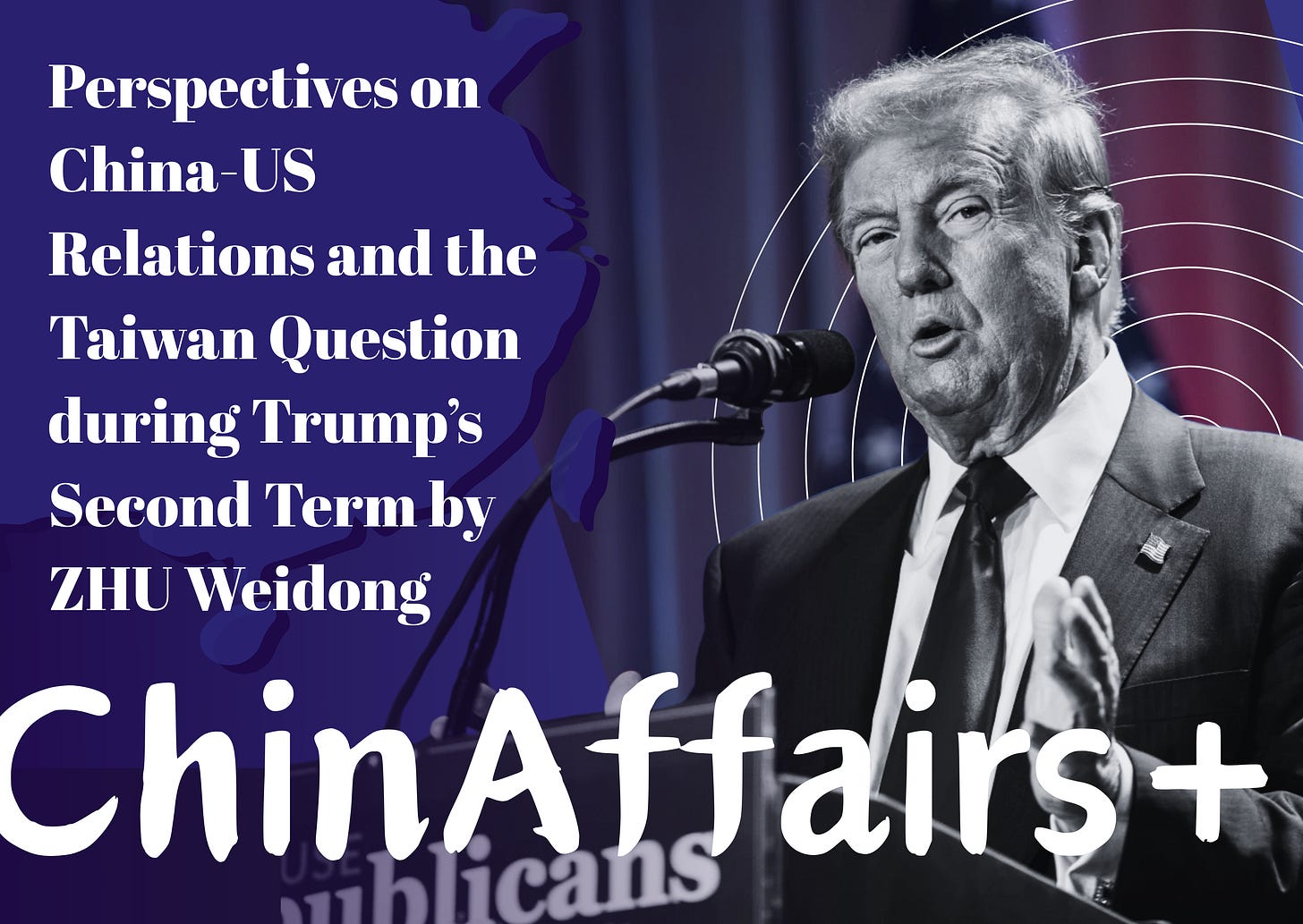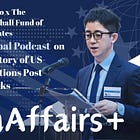Perspectives on China-US Relations and the Taiwan Question during Trump's Second Term by Zhu Weidong
The ‘Trump-Lai Effect’: Strategic Volatility and Beijing’s Calculated Response in a New Phase of U.S.-Taiwan-China Relations
Welcome to the 39th edition of our weekly newsletter! I'm SUN Chenghao, a fellow with the Center for International Security and Strategy (CISS) at Tsinghua University, Council Member of The Chinese Association of American Studies and a visiting scholar at the Paul Tsai China Center of Yale Law School (fall 2024).
ChinAffairsplus is a newsletter that shares articles by Chinese academics on topics such as China's foreign policy, China-U.S. relations, China-Europe relations, and more. This newsletter was co-founded by my research assistant, ZHANG Xueyu, and me.
Through carefully selected Chinese academic articles, we aim to provide you with key insights into the issues that China's academic and strategic communities are focused on. We will highlight why each article matters and the most important takeaways. Questions and feedback can be addressed to sch0625@gmail.com
Today, we have selected an article written by ZHU Weidong, which focuses on China-U.S. Relations and Taiwan Question during Trump 2.0.
Summary
Since Trump has come into power again, the storm centered around the ‘MAGA’ movement has swept across the globe, intensifying the uncertainty and unpredictability of China-US relations and the situation across the Taiwan Strait. Trump’s return also signals that the US policy of “using Taiwan to contain China, obstructing reunification and supporting ‘Taiwanese independence'” will enter a new stage.
China-US relations and the US’ cross-strait policy during Trump's second term will be deeply influenced by Trump’s ambitions, personality traits, power base and his policy orientation. The “Trump-Lai combination” will escalate the complexity and confrontational nature of the situation across the Taiwan Strait.
Facing the complex and grave challenges brought about by Trump's comeback, China must maintain strategic confidence and focus, and respond calmly. China should plan according to the current situation, as well as acting in response to the current situation while taking future trends into account. China should also shape China-US relations with its own strategic choices. From an overall strategy perspective, China should firmly and flexibly apply the strategy of “countering two-handed tactics with our own two-handed tactics”, be brave, virtuous and skillful in struggle, and seek to harmonise the China-US relationship. Regarding the Taiwan question, China should clearly and resolutely carry out the struggle against interference and separatism, making every effort to create a situation favorable to us and to prevent and defuse risks.
Why it matters
Lai’s inauguration in Taiwan in May 2, 2024 and Donald Trump’s more recent return to the US presidency marked the convergence of two disruptive figures, both seen as accelerants of geopolitical volatility. Their rise has reignited global concern over the Taiwan Strait—now widely viewed not only as a regional flashpoint, but as a focal point in the recalibration of the international order.
This article, written by Zhu Weidong, offers a perspective rooted in China’s conventional strategic discourse. It interprets the “Trump-Lai combination” as a structural threat to regional stability, arguing that the Taiwan issue is less a bilateral question than a product of long-standing US attempts to obstruct China’s rise. The article presents a layered diagnosis—linking Trump’s consolidation of power, the ideological alignment of his inner circle, and Taiwan’s pro-independence trajectory—to explain China’s growing strategic anxiety.
The choice to highlight this piece lies in its value as both an interpretive framework and a policy signal. It encapsulates how many Chinese scholars—and likely policymakers—understand Washington’s intentions, view Taiwan’s role, and evaluate China’s strategic options. It provides access to a coherent logic for international readers.
At the same time, the article warrants critical reflection, helping foreign observers grasp how China perceives red lines, escalation risks, and the evolving nature of great-power rivalry. In a moment of deepening strategic distrust, such insights are essential.
Key Points
As Donald Trump embarks on his second term, the dynamics of China-U.S. relations—and by extension, the Taiwan issue—are entering uncharted waters. Trump's return, laden with intensified ideological rigidity, personality-driven policymaking, and sweeping institutional control, signals a departure not only from Biden-era diplomacy but from his own previous presidency. When coupled with the ascent of Lai Ching-te, a staunchly pro-independence leader in Taiwan, the U.S.-China-Taiwan triangle is projected towards a period of unprecedented complexity, confrontation, and strategic risk.
1. Trump 2.0: A Strongman Unbound
Trump's return marks the dawn of a new phase in American politics: one of hyper-centralized power and ideological inflexibility. Armed with the presidency, a Trump-loyalist Congress, and a conservative Supreme Court, Trump is no longer restrained by the traditional checks that moderated his first term. This “three powers in one” configuration gives him near-unilateral freedom to reshape U.S. foreign policy.
His “America First” vision—once a campaign slogan—has morphed into a hardline doctrine of transactionalism and coercive diplomacy. Trump's governing style is now turbocharged by personal ambition to become the “Greatest President” by 2026. His second term is characterized by a bold MAGA ethos, with little concern for alliance management, normative leadership, or global stability. Foreign policy under Trump is thus expected to be driven less by strategic coherence and more by the immediacy of domestic political benefit.
Critically, Trump's second-term cabinet is dominated by China hawks who lack direct experience with the mainland and exhibit deep ideological hostility. Officials like Marco Rubio, Mike Waltz, and J.D. Vance are not only pro-Taiwan but openly suspicious of engagement with China. This configuration ensures that the Taiwan issue will become further entrenched in Washington's containment strategy.
2. Escalating the Strategy: Taiwan as a U.S. Lever
Trump’s victory does not mark a shift in Washington's Taiwan policy so much as a deepening of an already well-established trajectory. The strategic logic of “using Taiwan to contain China” has been a bipartisan constant, persisting through the Obama, Trump, and Biden administrations. What Trump’s second term introduces, however, is a more aggressive and instrumentalized approach.
His administration has already imposed sweeping tariffs on Chinese goods, and bipartisan legislative moves threaten to revoke China's Most Favored Nation status. Simultaneously, efforts to technologically decouple from China—especially in AI and semiconductors—have accelerated. Taiwan is being internationalized, militarized, and economically reorganized as a forward base in this great-power competition.
What sets Trump apart is his treatment of Taiwan not as a partner, but as a bargaining chip. Drawing on his legacy of transactional diplomacy, Trump is expected to demand more from Taiwan—militarily, financially, and economically. His insistence that Taiwan pay more for its “protection,” combined with accusations that TSMC is “stealing America's chip business,” illustrates a highly contingent loyalty. In this context, Trump's Taiwan policy is not one of steadfast alliance, but of conditional leverage.
3. Lai Ching-te: A Combustible Counterpart
If Trump is volatile, Lai Ching-te is combustible. Described in the article as “more pro-independence, more extreme, and more reckless” than his predecessors, Lai has wasted no time in adopting a confrontational stance. He has revived and reformulated the “Two States Theory,” systematically blocked cross-strait dialogue, and committed Taiwan to a path of deeper alignment with U.S. interests.
Despite leading with a “dual minority” (lacking both legislative and broad public support), Lai has cracked down on opposition voices, and pledged absolute loyalty to the U.S. strategy. His post-election overtures to Trump, filled with flattery and commitments, solidify his role as a willing pawn in the unfolding China- U.S. rivalry.
The combination of Trump's instrumentalism and Lai's ideological zeal is likely to yield dangerous synergy. The article warns of an era marked by closer U.S.-Taiwan security cooperation, more high-level exchanges, and sharper decoupling from the mainland—all of which will push Beijing's red lines to the brink. The “Trump-Lai duo” may therefore precipitate what the article terms “black swan” or “gray rhino” events—sudden crises or miscalculations in the Taiwan Strait that escalate out of control.
4. China's Strategic Posture: Composure and Preparation
Facing this turbulent new reality, the article calls for China to respond with strategic clarity and dual-handed pragmatism. Beijing is urged to neither act rashly nor passively absorb shocks. Instead, it must shape China- U.S. relations by aligning its actions with global governance principles and asserting its role in building a multipolar world order.
While reaffirming the importance of stable bilateral ties, the Chinese leadership reiterates its non-negotiable red lines: sovereignty, territorial integrity, and rejection of Taiwanese independence. Trump is reminded that while he may have transactional instincts, the Taiwan issue transcends deal-making; it touches the core of China's national spirit and legitimacy.
Beijing's strategic approach is grounded in a blend of resolve and flexibility. It emphasizes both dialogue—such as the early 2025 Xi-Trump phone call—and deterrence, including the reservation of force as a last resort. The use of non-peaceful means, the article stresses, would target foreign interference and separatists, not Taiwanese compatriots.
5. Outlook: Reunification Amid Uncertainty
The article closes on a forward-looking yet sober note. It asserts that the push for reunification is not just a policy objective but a historical imperative tied to China's national rejuvenation. But it also recognizes that the final steps toward this goal are the most difficult.
China must therefore uphold strategic foresight, patience, and risk awareness, managing international dynamics while minimizing costs. The Taiwan issue must not derail broader national priorities, nor should it be left unresolved indefinitely. In the struggle between Beijing's reunification goals and Washington's containment strategy, the coming years will test the limits of diplomacy, deterrence, and geopolitical endurance.
Conclusion
Amid historic global shifts and the drive for national rejuvenation, China is advancing reform and modernization with firm resolve. The Taiwan question cannot be delayed indefinitely—reunification is both a moral imperative and an unstoppable trend. As China approaches this long-standing goal, the challenges grow more complex, especially amid intensifying China- U.S. tensions. This demands strategic vision, patience, and resolve. By managing risks, shaping the environment, and minimizing disruptions, China must seize the initiative and advance reunification at minimal cost, serving broader national interests and completing a vital step in its rise from strength to greatness.
About the Author
朱卫东 Zhu Weidong:Dr. Zhu is Director and Research Fellow at the Institute of Taiwan Studies, Chinese Academy of Social Sciences, and a recipient of the State Council’s Special Government Allowance. Recognized as a leading scholar under the “Four Batches” program, he has conducted Taiwan-related research for 37 years, with a focus on cross-Strait strategy and policy. He also serves as a professor and doctoral advisor at Xiamen University, Deputy Director of the Collaborative Innovation Center for Cross-Strait Relations, and expert advisor to the Taiwan Affairs Office, the United Front Work Department, and Xinhua News Agency.
About the Publication
The Chinese version of the article was published by Taiwan Studies (《台湾研究》) , the earliest academic journal in mainland China dedicated to Taiwan research. Established in 1983, it is supervised by Xiamen University and published by its Institute of Taiwan Studies. It publishes scholarly articles on Taiwan’s politics, economy, law, history, literature, society, and cross-strait relations, serving researchers, policy professionals, and those interested in Taiwan affairs.










